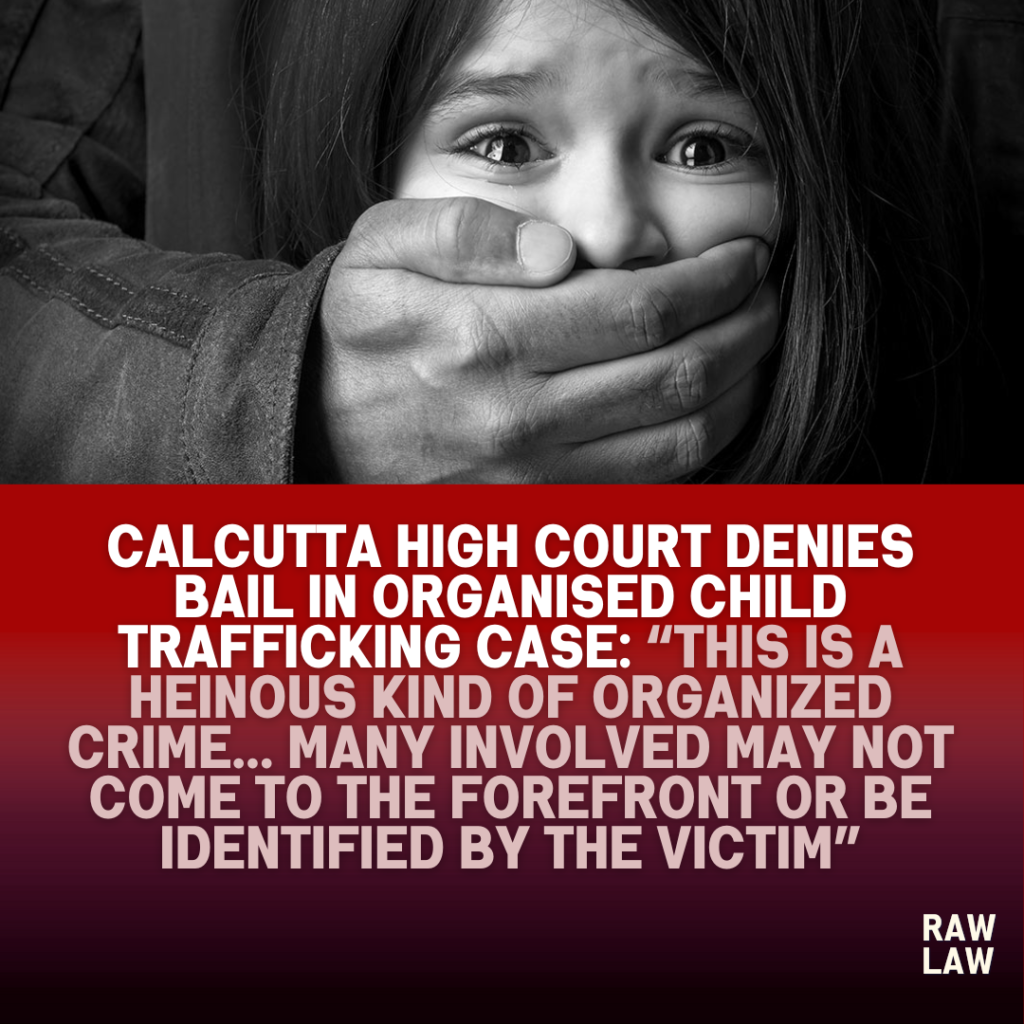Court’s Decision
The Calcutta High Court rejected the petitioner’s renewed application for bail under Section 483 of the Bharatiya Nagarik Suraksha Sanhita, 2023 (corresponding to Section 439 of the Criminal Procedure Code) in a serious case involving alleged child trafficking and other grave offences. The Court noted that the same grounds had been pressed earlier and were already considered and rejected. Observing no fresh grounds and reiterating the severity of the crime, the Court dismissed the bail application while directing the Trial Court to expedite proceedings and complete the trial without unnecessary delays.
Facts
The petitioner sought bail in a case pending before the Special Judge under the POCSO Act at Barasat, arising out of charges under multiple provisions of the Indian Penal Code (Sections 343, 366A, 366B, 368, 370(4), 372, 373, 120B), Section 5 of the Immoral Traffic (Prevention) Act, 1956, and Sections 4 and 17 of the Protection of Children from Sexual Offences Act. The petitioner had earlier filed a bail application which was rejected. In the renewed application, the petitioner argued that he was not named by the victim, was not identified in court, and was implicated only based on a co-accused’s statement.
Issues
- Whether the petitioner is entitled to bail considering he was not named or identified by the victim.
- Whether the continuation of trial with most witnesses already examined alters the ground for granting bail.
Petitioner’s Arguments
The petitioner’s counsel contended that the victim had not identified or named the petitioner in court. He argued that the sole basis for implication was a co-accused’s statement. It was also submitted that although the State had previously indicated it would examine only 12 witnesses, 13 had already been examined, suggesting discrepancies in the prosecution’s earlier submission.
Respondent’s Arguments
Counsel for the State opposed the bail, asserting that the petitioner was part of an organised child trafficking racket, with involvement evident from witness statements. The respondent acknowledged the earlier submission about limiting the number of witnesses to 12 but explained that four vital doctors had yet to be examined. It was further submitted that only four witnesses remain—two independent witnesses and two investigating officers.
The de facto complainant’s counsel reiterated that the grounds raised in the present application had already been dealt with in the earlier application, which was rejected due to the gravity of the offence.
Analysis of the Law
The Court considered the application under Section 483 of the Bharatiya Nagarik Suraksha Sanhita, which is the provision analogous to Section 439 of the Criminal Procedure Code for seeking bail in serious criminal matters. The allegations involved offences under the Indian Penal Code and special legislations like the POCSO Act and the Immoral Traffic (Prevention) Act, reflecting the statutory gravity of the charges.
Precedent Analysis
The Court relied on its earlier order in CRM (DB) 364 of 2025 where the same grounds were taken and rejected. The previous order observed:
“The allegation is of child trafficking. This is a heinous kind of organized crime. All persons involved in such a crime may not come to the fore front and may not be identified by the victim. Many of the involved persons operate behind the curtains.”
This observation was central to the present rejection as the court saw no fresh change in circumstances or legal grounds to reconsider.
Court’s Reasoning
The Court found that the current bail plea did not raise any new or fresh grounds that had not already been considered. It reiterated that identification by the victim is not necessary in organised crimes like child trafficking, where many participants remain hidden or act indirectly. The number of witnesses already examined was deemed irrelevant to the merits of the bail plea, as the prosecution retains discretion over whom to examine.
Conclusion
The Court rejected the bail plea on the ground that the petitioner had not raised any new issue that warranted reconsideration. It reaffirmed the serious nature of the offence and reiterated its earlier view on the organised nature of the crime. However, it directed the Trial Court to expedite the trial and ensure witness production without delay, further directing the parties to cooperate.
Implications
This judgment reinforces the Court’s zero-tolerance approach toward organised crimes like child trafficking. It sends a strong message that procedural lapses or victim non-identification do not automatically weaken the prosecution’s case in such crimes. The judgment also reflects judicial sensitivity towards speedy trial and ensures that procedural fairness is maintained without granting liberty where serious allegations exist.
Cases Referred and Their Relevance
- CRM (DB) 364 of 2025: The earlier bail application in the same case was referred to and its reasoning was reiterated in full. The observations in that order on the nature of organised crime and difficulty in victim identification formed the foundation for rejecting the present bail plea.
FAQs
- Why was the bail application rejected despite the victim not identifying the accused?
The Court held that in organised crimes like child trafficking, all involved may not be visible or identifiable to the victim. Mere non-identification is not sufficient for bail. - How many witnesses remain to be examined in the case?
According to the State, 13 witnesses have already been examined, and four—comprising two independent witnesses and two investigating officers—remain. - What direction did the Court give regarding the trial? The Court directed the Trial Court to expedite the proceedings, avoid unnecessary adjournments, and ensure the production of remaining witnesses on scheduled dates.



